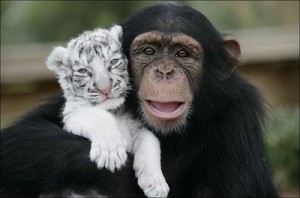Can a Chimpanzee Achieve Legal Personhood?
The Nonhuman Rights Project (NRP) recently filed suit against Circle L Trailer Sales in a New York court for imprisoning Tommy. Who is Tommy? Tommy is a chimpanzee.
The NRP is pursuing this case as part of an aggressive legal campaign to “breach the legal wall that separates all humans from all nonhuman animals.” The NRP believes that Tommy is being held captive in violation of his right to liberty.
 The NRP is suing not on the basis of animal welfare laws, but through the Writ of Habeas Corpus, the legal doctrine that judges use to call upon jailers to explain why they are keeping a person prisoner. Essentially, the NRP are trying to claim the same right for Tommy that prisoners in Guantanamo Bay are trying to assert for themselves.
The NRP is suing not on the basis of animal welfare laws, but through the Writ of Habeas Corpus, the legal doctrine that judges use to call upon jailers to explain why they are keeping a person prisoner. Essentially, the NRP are trying to claim the same right for Tommy that prisoners in Guantanamo Bay are trying to assert for themselves.
Of course, “freedom” for Tommy wouldn’t be total freedom. The NRP are only asking that the Tommy, and others like him, be moved to a sanctuary with more room and fellow chimpanzees, unlike the “cage in a shed at a used-trailer lot” that Tommy is living in now. More significantly, chimpanzees in similar conditions have died before the NRP could resolve the case. To succeed on the Habeas Corpus claim though, the NRP must argue that chimpanzees are legal persons and that Tommy is currently being held captive. However, both claims face serious uphill battles.
Can an Animal Be Recognized as a Legal Person?
One of the few legal precedents for legal personhood of animals is that animals can be beneficiaries of a trust. That analogy only works if we strip trust law of all context. The reason animals are legal persons for the purpose of a trust is that animals cannot inherit from wills as legal persons. Cats, dogs, parrots and other pets can only inherit from trusts because the animal needs a human, a trustee, to act on their behalf. Animals cannot use property or money without a human. More importantly, the purpose of probate law in general is to facilitate the wishes of the deceased. If a cat is a legal person in a trust, it’s for the benefit of the owner, not the cat.
Even if the NRP could convince a trial judge that Tommy is a person, they still have to prove that Tommy is being held captive. The NRP points to the 1772 case of James Somerset, the first English case to recognize an African as a person rather than property. The link to slavery is tenuous. According to Patrick Lavery, the owner of the trailer lot, Tommy has a “spacious cage with tons of toys.” The trailer lot had tried to place Tommy in a sanctuary before, but Tommy had been denied for lack of space. More importantly, Tommy had been mistreated by previous owners. As far as Lavery is concerned, he is not a jailer but a rescuer.
Should Animals Be Given Legal Personhood?
The NRP realize that this case is a long shot, but win or lose there will be an appeal. Setting aside the law for a moment, however, we should consider if animals should be given legal personhood. Non-physical corporations have legal personhood, but at least corporations are made up of humans. On the other hand, the reason corporations have personhood and animals do not is that corporations have more, much more, power than animals. Arguably, corporations have more power than most humans.
Sadly, power is often the deciding factor. Power is the deciding factor not only for legal personhood, but in our legal system in general. Trusts are built for humans. Legal personhood was built to establish who was worthy of legal protection and who wasn’t.
The character of a man is based on how he treats his inferiors, rather than his equals. The NRP want to give Tommy, a chimpanzee living in New York, legal personhood so that he has a right to liberty. It would be appropriate if, in some post apocalyptic future, a man knelt in the ruins of New York and mourned the loss of Lady Liberty.


Comments